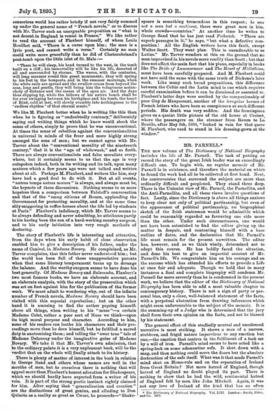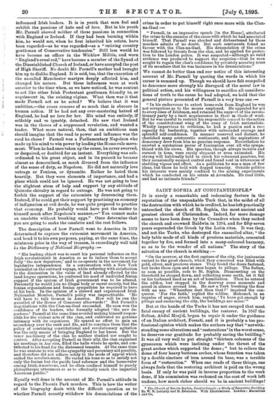MR. PARNELL.*
THE new volume of The Dictionary of National Biography includes the life of Mr. Parnell. The task of putting on record the story of the great Irish leader was an exceedingly difficult one. To begin with, no regular memoir of Mr. Parnell is in existence, and therefore the material on which to found the work had all to be collected at first band. Next, the controversies that surround the subject are more than ordinarily difficult and perplexed. They stand three deep. There is the Unionist view of Mr. Parnell, the Parnellite, and the Anti-Parnellite, and all these views involve questions of fact. Lastly, since the Dictionary is above all things anxious to keep clear not only of political partisanship, but even of the appearance of political partisanship, no biographical sketch of the Irish statesman would be admissible which could be reasonably regarded as favouring one side more than the other. Under such circumstances, one would not have been astonished to find the editor giving up the matter in despair, and contenting himself with a bare outline of dates, and the declaration that Mr. Parnell's life must remain for the present unwritten. The editor has, however, and as we think wisely, determined not to adopt this course. He has boldly faced the situation, and done his, best to give an impartial account of Mr. Parnell's life. We congratulate him on his courage and on the success which has attended his efforts to provide a Life at once fair and adequate. Though we hold that in many instances a final and complete biography will condemn Mr. Parnell far more severely than he is condemned in the present work, we believe that the editor of the Dictionary of National Biography has been able to add a most valuable chapter to contemporary history. There is not a sign of party or per- sonal bias, only a clear, well-balanced statement of the facts, with a perpetual abstention from drawing inferences which might seem unfavourable to the subject of the memoir. It is the summing-up of a Judge who is determined that the jury shall form their own opinion on the facts, and not be biassed by his statement.
The general effect of this studiedly neutral and uncoloured narrative is most striking. It shows a man of a narrow, stubborn, and frigid nature impervious to any emotion but one,—the emotion that centres in the fulfilment of a task set by a will of iron. Parnell's mind seems to have acted like a spring-lock on some adamantine safe. It shut down with a snap, and then nothing could move the doors but the absolute destruction of the safe itself. What was it that made Parnell's mind shut on Home-rule and on the separation of Ireland from Great Britain ? Not mere hatred of England, though hatred of England no doubt played its part. There is nothing to show that he had the wild, sentimental hatred of England felt by men like John Mitchell. Again, it was not any love of Ireland of the kind that has so often
• The Dictionary of National Biography. Vol. LIII. London: Smith, Elder, and Co. IM
influenced Irish leaders. It is in youth that men feel and exhibit the passions of hate and of love. But in his youth Mr. Parnell showed neither of these passions in connection with England or Ireland. If they had been burning within
him, he would not, when he first inherited his estate, have been regarded—as he was regarded—as a " retiring country gentleman of Conservative tendencies." Still less would he have become an officer in the Wicklow Militia, and worn " England's cruel red," have become a member of the Synod of the Disestablished Church of Ireland, or have accepted the post of High Sheriff. No doubt Mr. Parnell's mother had brought him up to dislike England. It is said, too, that the execution of
the so-called Manchester martyrs deeply affected him, and changed his nature. Bat these influences were at work anterior to the time when, as we have noticed, he was content to act like other Irish Protestant gentlemen friendly to, or acquiescent in, the existing regime. What then was it that made Parnell act as he acted? We believe that it was
ambition,—the causa causans of so much that is obscure in human action. If he had not any over-mastering hatred of
England, he had no love for her. His mind was entirely, if selfishly and 10 ignobly, detached. He saw that Ireland was in the throes of a suppressed revolution, and wanted a leader. What more natural, then, that an ambitious man
should imagine that the road to power and influence was the road he chose P Parnell was a Parliamentary Napoleon who made up his mind to win power by leading the Home-rule move- ment. When he had once taken up the cause, he never swerved,
-or despaired, or doubted for an instant. Everything was sub- ordinated to his great object, and in its pursuit he became almost as demoralised, as much divorced from the influence of the sense of duty, as Napoleon. He did not naturally love outrage or Fenians, or dynamite. Rather he hated them heartily. Bat they were elements of importance, and had a place which could not be ignored. He was not going to lose the slightest atom of help and support by any attitude of Quixotic chivalry in regard to outrage. He was not going to forfeit the support of the extremists by denouncing them.
Instead, if he could get their support by practising an economy of indignation at evil deeds, he was quite prepared to practice that economy. He probably would have put the matter to
himself much after Napoleon's manner,—" You cannot make an omelette without breaking eggs." Once determine that you are going to make the omelette and the rest follows.
The description of how Parnell went to America in 1879 determined to capture the extremist movement in America, and bend it to his own purposes, paying, at the same time, the minimum price in the way of treason, is exceedingly well told
is the Dictionary of National Biography :— " His leading object was to exert his personal influence on the Irish revolutionists in America so as to induce them to accept fully the new departure,' and to co-operate in the movement for legislative independence. In a conversation with a New York journalist on the outward voyage, while referring with satisfaction to the diminution in the value of land already effected by the land•league operations, he confessed his need of undivided fenian support if the system of Irish government was to be altered. Personally he would join no illegal body or secret society, but the fenian organisations and fenian sympathies he required to have at his back. In the opinion of a shrewd and experienced Irish Nationalist Member, Parnell's policy was impracticable. 'He will have to talk treason in America. How will he run the gauntlet of the House of Commons afterwards ? ' But Parnell's negotiations with the Clan-na-Gael succeeded. He soon won the .confidence of its leaders, who formally adopted the new de- parture.' Parnell at the same time avoided making himself respon- sible for the violent acts of the clan, and cultivated no genuine intimacy with its organisers. He spared no effort to gain an ascendency over the rank and file, and to convince them that the policy of combining constitutional and revolutionary agitation was the only means of bringing England to her knees. But the inner machinery of the clan he neither studied nor sought to control. After accepting Parnell as their ally, the clan organised his meetings in Am. rice, filled the halls where he spoke, and con- tributed to his fund for the distressed tenants. At the same time he was anxious to win all the sympathy and pecuniary aid possible, and therefore did not adhere solely to the mode of apral which suited the revolutionists. He varied his tone so as to satisfy not only the fenian but the pacific land reformer and the home-ruler among Irish-Americans, and he often confined himself to purely philanthropic utterances so as to effectually reach the impartial American public."
Equally well done is the account of Mr. Parnell's attitude in regard to the Phoenix Park murders. This is how the writer of the biography deals with the difficult question as to
whether Parnell secretly withdrew his denunciations of the crime in order to put himself right once more with the Clan. na-Gael :-
" Parnell, in an impressive speech [in the House], attributed the crime to the enemies of the cause with which he had associated himself. That Parnell was shocked and disheartened by these murders admits of no doubt. But such sentiments found no favour with the Clan-na-Gael. His denunciation of the crime was followed by threats from the clan, and he applied for protec- tion to the London police. It was suspected—although no valid evidence was produced to support the suspicion—that he soon sought to regain the clan's confidence by privately assuring some of its members that he was insincere in his denunciations."
We cannot do better than end our notice of this interesting account of Mr. Parnell by quoting the words in which his career is summed up. Though we should have felt compelled to denounce more strongly his disregard of the moral law is political action, and his willingness to sacrifice all considera- tions of truth to the cause he had adopted, we hold that the general picture presented of Parnell is a very true one " In his endeavours to extort home-rule from England he was not scrupulous as to the means employed. He appealed for aid to every class of Irishmen, and retained the support of the revolu- tionary party by a tacit acquiescence in their m 'thods of work. But he was careful to restrict his responsible control to the action of the constitutional wing of the army of Irish nationalists. Wholly impervious to criticism, he had a passion and a rare capacity for leadership, together with unbounded courage and splendid self-confidence. In manner reserved and distant, he cherished many aristocratic sentiments, and the aspirations of democracy drew from him no genuine response. Nevertheless be exerted a mysterious power of fascination over all who sympa- thised with his views. His speeches, though always incisive and earnest in tone, were rarely eloquent or even animated. His strong will habitually held in check his vehement passions, but they occasionally escaped control and found vent in utterances of startling vigour and effect. As a politician he was a man of few ideas, but those he held with dogged tenacity. Outside politics his interests were mainly confined to the mining experiments which he conducted on his estate at Avondale. He road little, and had no intimate friends."









































 Previous page
Previous page